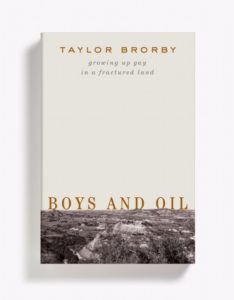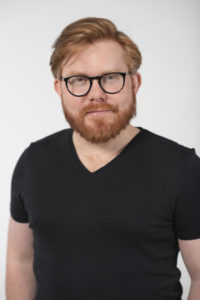In Taylor Brorby’s new memoir, Boys and Oil: Growing Up Gay in a Fractured Land (Liveright/WW Norton, 2022), he describes his childhood and adolescence on the barren yet beautiful prairie of North Dakota. Amid a small-town culture of toxic masculinity, which becomes both oppressive and dangerous, he struggles to find acceptance and belonging, before finally setting out to find someplace that feels like home. Brorby has written for Orion and The Huffington Post, and is also the author of Coming Alive: Action and Civil Disobedience, and co-editor of Fracture: Essays, Poems, and Stories on Fracking in America.
Taylor had already begun work on his memoir when we first met in a 2014 Collegeville writing workshop: Apart and Yet a Part. Since that time, we have reunited at various writing conferences to catch up and discuss our lives and work. With the release of his memoir today, I reached out to ask a few questions about the new book and how he was feeling about it.
Your new book tells the story of your whole life, and your journey toward self-acceptance and affirmation of your identity as a gay man. How were you able to share an entire life in a few hundred pages? Can you describe your writing process a bit?
Being gay requires continually coming out whenever you move, make new friends, or take on a new job. To mimic that process, I felt I needed to convey the trajectory of my life up to the current moment. It’s not that my liking my mother’s high heels as a child or my obsession with drawing makes me gay—but they are visceral memories in my mind that still stick out, nearly thirty years later. It’s those moments, the ones that are sharp and vivid, that I put into this memoir, which is, after all, an assemblage of memories. I wanted to drop the reader into those moments and trusted that if I wrote well enough, then it would create a type of mosaic of my life that also follows my life chronologically. In the book, I’ve structured its movements by the botanical terms for the parts of a blade of grass—the book is set largely on the prairie, after all.
Your struggles in the book are personal, but they become more political as you get involved in the struggle against the Dakota Access Pipeline and other related issues. Your writing is both a kind of art and activism. How do you balance those approaches to your life and work, or are they integrated into your life?
Balance—ha! My friends would tell you I’m anything but balanced. I’m rather obsessive with my interests and a bit monomaniacal in my focus.
The late Toni Morrison said all art is political, and I believe her. It’s not so much that I view myself as political, but political systems have marginalized me. Right now, anti-LGBTQ legislation is sweeping the country, we’re bringing back the old pastime of banning books, and—though this is only glancingly referenced in the book—I’m a type 1 diabetic. My very existence, under these strictures, is political. I have a baseball hat that says “Gay and Tired,” which I think is very funny, but I wouldn’t wear that hat in many places in America for fear of being verbally or physically assaulted. What does that say about us as a society? Am I political, or are political systems at work against people like me?
The same systems that bring about the destruction of the planet bring about the destruction of people. Our economy, as Wendell Berry reminds us, is supposed to take care of the household—“economy” comes the Greek word oikos, which means the care of the household—but our economy is predicated on people working to the bone for less and less, increasing stress within communities, and the type of violence that fossil fuel economics wrecks upon the landscape can lead to a type of anger, depression, and violence that then can be wrought upon women and minorities. At the height of the Bakken oil boom, in the early 2010’s, violence against women increased; this type of economic model also means queer people need to do their best to “fit in,” which means, staying in the closet to stay alive.
This book is heartbreaking for so many reasons: your parents’ rejection, the brutal homophobia and violence you encountered, and the resulting spirals of depression and anxiety. Yet the book also feels like an invitation to others having similar struggles—that they might find their story in yours. Can you say more about this?
To keep queer children alive. That was my sole goal. To my knowledge, there is no other memoir about growing up gay on the rural Great Plains and Intermountain West. I know there are gay people in these places—I have been one, after all. But survival—just surviving—is so damn hard. It is a sparse, deceptively bare, landscape where everything is revealed. And to be revealed as different from the majority can, in many ways, be life-threatening. I wanted to create a book, however complicated and without answers, to at least say, “You must keep going. Your one goal is to survive.” I wrote the book I wish was on the library shelf when I was little. That’s a tall order to fill. I hope I’ve done it well.
 The Christian Church seems an important part of your life. You even enroll in seminary at one point. But many churches are brutally homophobic and define homosexuality as “sin.” However, you belonged to a Lutheran church in the Twin Cities that embraced and affirmed you. You had friends you trusted there and were able to seemingly imagine a church home. Given your life experience, how is “the church” doing in terms of including/affirming the gay community, and what advice do you have for others to negotiate the landmines of homophobia that are still so common?
The Christian Church seems an important part of your life. You even enroll in seminary at one point. But many churches are brutally homophobic and define homosexuality as “sin.” However, you belonged to a Lutheran church in the Twin Cities that embraced and affirmed you. You had friends you trusted there and were able to seemingly imagine a church home. Given your life experience, how is “the church” doing in terms of including/affirming the gay community, and what advice do you have for others to negotiate the landmines of homophobia that are still so common?
Of course, it depends on what denomination and which part of the country we’re talking about. I take the gospels very seriously, and much of the Bible I take as seriously as Emily Dickinson, Ralph Waldo Emerson, and James Baldwin, which is to say—for the third time—very seriously. It’s high time we retire phrases such as “hate the sin, not the sinner.” And it’s high time that the church understands itself as part of a wider tradition that seeks to shed light on the human condition. If there is a God, I doubt God would create humans just so that their existence can be a model or testing ground for oppression. The church can be a model for the world as it could be, rather than the world as it is. I’d hope, no matter what denomination or faith background a person is a part of (or not), they’d agree that oppression, subjugation, and creating systems where certain groups of people are classified as second-class citizens should not be the basis of a life of faith.
To navigate these landmines, some people—particularly queer people—need to find a safer harbor. If your church is intolerant of you, get the hell out and find someplace else. If you’re an ally, do the good work of protecting others—speak openly and honestly with others. Advocate for inclusion. What was so incredible to me was that my home church when I was living in the Twin Cities, Christ Church Lutheran (CCL), a former Missouri Synod church now part of the ELCA, went through a year-long conversation process to become a Reconciling in Christ (RIC) church, which is a designation that signals a church in the ELCA is open and affirming, particularly, of queer people. My church’s response? That the standards of being RIC didn’t go far enough. That’s what a radical welcome looks like. There wasn’t any doubt about CCL becoming RIC, but over a year of adult forums focused on LGBTQ+ literature, history, and conversations, everyone’s voice was heard, and it allowed enough time for anyone who might vacillate to fully understand why we needed such a warm welcome for queer people.
The only way forward, as I see it, is to share stories. Facts, figures, speaking down to others, in my experience, won’t shift perspectives—but sharing stories does. Perhaps have your church book group read works by queer authors, invite a queer-allied nonprofit to speak during an adult forum—and listen, listen, listen. As Mark Twain said, “God gave us one mouth and two ears for a reason.”




A model of an interview–intelligent, provocative questions and cogent, circumstantial, challenging answers. A particularly brilliant insight, posed as a rhetorical question: “Am I political, or are political systems at work against people like me?” It may be too glib to say “everything’s political” (though I sometimes suspect there is no counter-example), but what Brorby points to is–for sure.